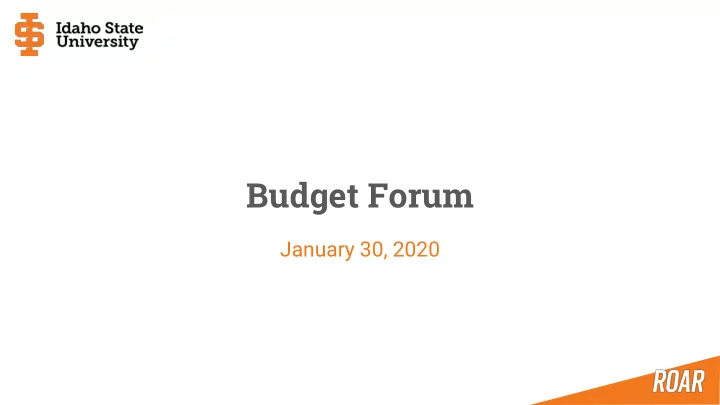

Budget Forum January 30, 2020
Agenda Context and Overview FY2020 Update Budget Balancing Ideas FY2021 Budget Development Process Revenue Overview Q&A
Context & Environment • State environment: economy, rescission, funding • No increases in undergraduate tuition and fees • Continued use of reserves as we focus on enrollment and retention growth strategies • Limited opportunities for investment of new funds • Focus on maximizing resources
Budget Development Process Principle-Driven Agile & Iterative Collaborative
Goals of Budget Process • Trust, transparency and inclusivity in budget development and administration • Maximization of University resources • Budgeting and decision-making informed by strategic plans and priorities • Budget structures that foster innovation and stewardship • Growth through mission-focused student recruitment and retention • Empowerment, mutual accountability, responsiveness and adaptation at the local level
Engagement and Communication • Meetings with unit leadership • Engagement plans • Faculty Senate • Department and division meetings • Drop In/Q&A sessions • Budget forums • Regular email communications • Budget website and feedback forms
FY2020 Update Structural Deficit $ ( 6 M) ………………………………………………………………………………………………………………………………... State Rescission $ (.8 M) Enrollment Shortfall ~ $ ( 4 M) One-time savings from units: $ 3 M Salary savings, irregular, operating
Ongoing Budget Balancing Ideas 260 ideas received to date Leadership Council develop a process for reviewing submissions: • New/Increased Revenue Streams • Staffing and Human Resources • Marketing and Recruitment • Facilities • Restructuring • Policies and Procedures • Efficiencies
FY2021 Balancing State Unit Budget Plans Appropriation Strategic Tuition & Fees Investments Ongoing Budget Local Revenue Balancing Ideas One-Time One-Time Savings Reserves Resources Expenditures
Long-Term Balancing Increased State Appropriation Increased Tuition & Fees • Address Student Increased Grant and Local Revenues Recruitment and Retention • Promote Identity and Increased Efficiency Culture Expenses Aligned with Student & • Focus on Relationships Activity Levels • Build Infrastructure Funding for Essential Needs and Strategic Investments Stable Fund Balances
Unit Budget Development Each unit is developing a FY2021 budget plan and narrative: • Salaried position lists • Irregular and operating budgets – starting with FY2020 reset base • Capital budgets • Local revenue estimates • Facilities and IT projects • Strategic investments: personnel, operating
Timeline January 7-17, 2020 Budget Meetings with Units Budget development resources distributed to units January 17, 2020 Student Activity Fee Narratives due January 23 & 24, 2020 Budget Drop In Sessions/Q&A January 30, 2020 Professional Fee Recommendations Due January 30, 2020 Open Campus Forum February 7, 2020 Facilities and IT Project Materials Due February 14, 2020 Open Campus Forum February 28, 2020 Unit Budget Materials Due March 1-27, 2020 Budget Submission Review, Analysis, Organization April 6-24, 2020 Budget Prioritization and Recommendations May 15, 2020 Budgets Distributed to Units
Revenue Overview January 2020 Dr. Glen Nelson, Vice President for Finance & Business Affairs
FY2019 Revenues $257.8 million Other, $5.6 State DPW Funding, Appropriations, $6.9 $100.0 Gifts, Capital Grants, $10.7 Title IV Grants, $16.2 Tuition and Fees, Sales and $74.3 Services, $20.7 Grants and Contracts, $23.4 ($ millions)
Revenue Trends FY2012-FY2019 All Revenues 290.0 270.0 250.0 $ millions 230.0 210.0 190.0 170.0 150.0 FY2012 FY2013 FY2014 FY2015 FY2016 FY2017 FY2018 FY2019
Revenue Trends FY2012-FY2019 State Appropriations 120.0 110.0 100.0 90.0 $ millions 80.0 70.0 60.0 50.0 40.0 FY2012 FY2013 FY2014 FY2015 FY2016 FY2017 FY2018 FY2019
Revenue Trends FY2012-FY2019 Tuition & Fees 95.0 85.0 75.0 $ millions 65.0 55.0 45.0 35.0 25.0 FY2012 FY2013 FY2014 FY2015 FY2016 FY2017 FY2018 FY2019
Tuition & Fee Revenue Tuition & Fee Revenue Adjusted for Rate Increases FY2012-FY2019 95 330 Tuition & Fees ($ millions) Credit Hours (thousands) 90 320 $86 85 310 80 $74 300 75 70 290 65 280 60 270 55 50 260 FY2012 FY2013 FY2014 FY2015 FY2016 FY2017 FY2018 FY2019 Net Student Tuition and Fees Revenue at FY2012 Enrollment Levels Student Credit Hours
Student Credit Hours FY2012-FY2019 330,000 320,000 310,000 300,000 290,000 280,000 270,000 260,000 2012 2013 2014 2015 2016 2017 2018 2019
Student Credit Hours FY2012-FY2019 All Students Non-Resident 330,000 80,000 320,000 70,000 310,000 60,000 300,000 50,000 290,000 40,000 280,000 30,000 270,000 20,000 260,000 10,000 2012 2013 2014 2015 2016 2017 2018 2019 2012 2013 2014 2015 2016 2017 2018 2019 Early College Undergraduate Resident 245,000 25,000 22,500 225,000 20,000 205,000 17,500 15,000 185,000 12,500 165,000 10,000 145,000 7,500 5,000 125,000 2012 2013 2014 2015 2016 2017 2018 2019 2012 2013 2014 2015 2016 2017 2018 2019
Grants and Contracts FY2012-FY2019 400 35 Revenue ($ millions) 350 33 Proposals and Awards (count) 300 30 250 28 200 25 150 23 100 20 50 18 0 15 FY2012 FY2013 FY2014 FY2015 FY2016 FY2017 FY2018 FY2019 Proposals Submitted Awards Received Grants and Contracts Revenue
Revenue Summary FY2012-FY2019 • Total annual revenues ~ $259 million ISU Revenues 95.0 • State Appropriations have been steadily 85.0 increasing and comprise 39% of total revenues 75.0 Revenue ($ millions) 65.0 • Tuition and Fee revenues, 29% of total: Returned to FY2012 levels 55.0 • 14% fewer total credit hours • 45.0 Large increase in dual enrollment • 35.0 Significant decrease in resident undergraduates • 25.0 • Decreased research revenues 15.0 State Tuition and Fees Grants and Other Appropriations Contracts • All other revenue categories are flat FY2012 FY2019
Q&A nelsglen@isu.edu ♦ steejenn@isu.edu ♦ isu.edu/budget
Recommend
More recommend